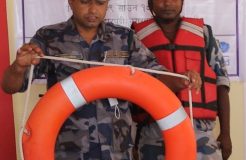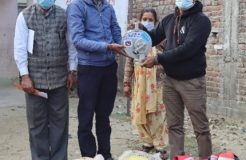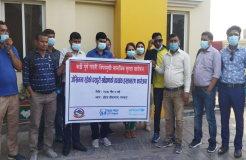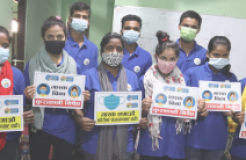Menu
- Celebrating 12 Years
Emergency
Thematic Area / Emergency

The municipality is on standby and prepared to respond promptly to floods.
Shahid Nagar Municipality, located in the vulnerable Dhanusha district of Madhesh Province, faces significant threats from flooding caused by the Kamala River. With over 14 thousand residents, 274 households are identified as being at high risk of flooding, resulting in an average of 12 people missing or losing their lives annually due to floods. To address this ongoing challenge, Sahid Nagar Municipality, in collaboration with LIFE Nepal, has been implementing a flood preparedness and response program from 2020 to 2022. This initiative receives technical and financial support from UNICEF. The municipality has taken various measures to enhance its flood response capabilities, including the procurement of search and rescue materials such as rubber boats, sirens, life jackets, helmets, pedals, rubber tubes, and personal protective equipment (PPE) sets. Additionally, the municipality has well-managed shelter houses with washing facilities, initiated an early warning system with siren houses, and established a capable and trained team for Local Disaster Management Committee (LDMC), first aid, and rescue operations. Furthermore, the municipality has fostered strong coordination with the Area Police Office and the Armed Police Force, enhancing the overall flood response capabilities. Mayor Mr. Uday Kumar Barbariya acknowledges the municipality's preparedness, emphasizing their capability to respond effectively to floods with sufficient rescue and search materials, including a helipad. The municipality remains in a constant state of readiness to respond promptly to any flood-related emergencies.

The municipality is prepared to cope with floods.
Two years ago, the community in Rajpur Municipality, Rautahat District, faced severe impacts from heavy rainfall and flooding. In response to this, Rajpur Municipality took proactive measures by establishing a Local Disaster Management Committee ahead of the monsoon season. The municipality also organized and equipped shelter houses with toilet facilities and arranged rescue materials, including life jackets, helmets, sirens, tubes, hand pumps, cleaning materials, PPE sets, masks, sanitizers, dustbins, jugs, shops, hand wash stations, and first aid kits. This was made possible with the financial assistance of UNICEF and in collaboration with LIFE Nepal. Ward number 9 in Rajpur has 274 vulnerable houses, and in response to this, Ward Commissioner Md. Asraf Ali, Health Assistant Md. Khurshid Alam, and the Chairperson of the Risk Reduction Committee Md. Katful Baral took on the responsibility. They recognized their capability to manage flood responses in the municipality. The individuals involved expressed gratitude to UNICEF and LIFE Nepal for their commendable contribution in providing technical support and necessary equipment to enhance their capacity to deal with floods effectively.

Shock Responsive Social Protection
To address the scarcity of a robust Shock-Responsive Social Protection mechanism at the Palika level and establish a connection between vulnerable households and banks, LIFE Nepal, with technical and financial assistance from UNICEF, implemented the "Shock-Responsive Social Protection" program in four selected Palikas across two districts in the Madhesh Province of Nepal. As part of this program, an updated list of vulnerable households was compiled in the targeted four flood-prone Palikas, involving trained enumerators. Information from 1,542 households was collected through KOBO, and an impressive 93% of them (1,437 households) were successfully linked with banks to open bank accounts. The outcomes of the program include increased awareness and responsiveness among community members regarding social protection services provided by the government of Nepal. Additionally, individuals without bank accounts initiated the process of opening one, recognizing the importance of having a bank account. Furthermore, there was a realization of the necessity of an identity card for opening a bank account, prompting individuals to take steps to obtain their identity cards. This program has made significant strides in strengthening the Shock-Responsive Social Protection mechanism at the local level and improving financial inclusion for vulnerable households.

COVID-19 Response
LIFE Nepal, with technical and financial support from UNICEF, implemented the "Risk Communication and Community Engagement (RCCE) on COVID-19" program in 32 selected Palikas across eight districts of the Madhesh Province. This program was designed to be an effective strategy for COVID-19 preparedness and response, with a focus on gender responsiveness and inclusion of all segments of society, especially the most vulnerable and marginalized social groups. As part of this initiative, LIFE engaged communities to garner support for the adoption of COVID-19 preventive measures and enhance access to services. The program involved a total of 352 lead/volunteers who were actively engaged in door-to-door visits and information collection. They played a crucial role in promoting social distancing, the use of masks and sanitization, and conducting behavior data collection and vaccination awareness through door-to-door visits and megaphone announcements. This comprehensive approach to risk communication and community engagement aimed to ensure that preventive measures were effectively communicated and embraced across diverse segments of the population, contributing to the overall preparedness and response to the COVID-19 pandemic in the Madhesh Province.

LIFE Nepal is a non-profit organization dedicated to promoting children’s rights and equality for girls. It was registered at the District Administration Office, Dhanusha, in 2012.
Quick Links
Resources
Contacts
Pidarichowk, Janakpur, Dhanusha
Madhesh Province, Nepal
Copyright ©2024 Lifenepal.org. All Rights Reserved.
LIFE Nepal | Developed By N1technology Pvt. Ltd..
